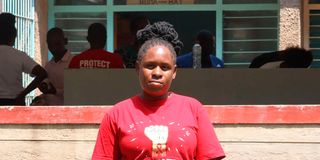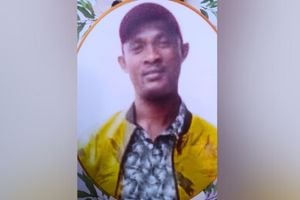On the frontlines of the fight for sexual reproductive health rights among young people

What you need to know:
- The group meets every Thursday to discuss issues affecting youth and are supported by different groups including Ipas, an international, non-governmental organisation that seeks to increase access to reproductive health.
- Mercy also gets support from Community Aid Transformation Alliance Group (Catag) which advocates for the rights of women and children.
- During the meetings which are meant to offer civic education, the youth have dialogues on reproductive health.
As Gen Zs across the country were mobilising themselves on social media to push for reforms in government, another set of youth in Homa Bay was using the same platform to advocate for their sexual and reproductive rights (SRHR).
The mobilisation by the larger group of youth, and the subsequent national protests, led to changes in government, including firing of some cabinet members and reduction of government spending.
For the youth in Homa Bay who were fighting for reforms in reproductive health however, the fruits of their advocacy are yet to show.
But, they have not given up. They plan to continue knocking the relevant doors to bring positive change to their community.
Mercy Kwamboka is among those leading in this quest to make sexual and reproductive health services available to all in Homa Bay county.
The 25-year-old spends most of her time in meetings with different agencies to discuss how Homa Bay residents, especially those aged below 35, can access reproductive health services.
Mercy says she got into advocacy when she realised that her peers were struggling to get information about reproductive health, and sexuality.
“I was personally affected. I would struggle to get help whenever I was in need of these services,” she says, explaining that it was hard to access condoms, HIV testing kits, HIV prevention drugs, and information on family planning and other reproductive health matters.
Despite the slow progress, she believes her efforts are bearing fruits.
“A lot of organisations have reached out to us asking for further discussions regarding the issues we have raised. So far, our efforts have been successful. Recently, through our advocacy, we managed to get a fresh supply of antiretroviral drugs which were in short supply after a consignment was stuck at the Mombasa port,” Mercy says.
Throughout her life, the activist believed she was destined to work in the hospitality industry.
She studied food and beverage at Eldoret National Polytechnic and graduated with a diploma in 2020.
But the challenges she faced in accessing sexual reproductive health services pushed her to drop her ambition of working in the hospitality industry, and adopt activism.
“I observed that young people were struggling to access some services in hospitals such as family planning, HIV counseling and maternal and child health service. Some services like treatment of sexually transmitted infections (STI) are expensive and some youth suffer in silence because of lack of funds. I wanted to change this narrative and decided to come out to be the voice of the young people,” she says.
Mercy currently serves as the president of Youth Advocacy Council for Health (YACH) in Homa Bay which has more than 100 members.
She explains that YACH was formed by Liverpool VCT, a non-governmental organisation that supports the fight against HIV in Homa Bay by supporting health facilities with the necessary testing equipment.
Group members who have training on matters such as basic counselling, behavioral change and advocacy help the group achieve its objectives. They are using social media to push for reforms in the health sector.
“We also use mainstream media to advocate for changes whenever we see something going wrong.” Mercy says.
The group meets every Thursday to discuss issues affecting youth and are supported by different groups including Ipas, an international, non-governmental organisation that seeks to increase access to reproductive health.
She also gets support from Community Aid Transformation Alliance Group (Catag) which advocates for the rights of women and children.
During the meetings which are meant to offer civic education, the youth have dialogues on reproductive health.
“We conduct theory sessions where participants are asked to air out their challenges, then we discuss and try to find solutions,” Mercy says.
According to the activist, the sessions she conducts with her peers have a lot of health benefits including addressing mental health.
Currently, the team is trying to push for a larger supply of condoms in public places to control transmission of HIV, and address teen pregnancies.
Mercy says condom dispensers that were full about three months ago are now empty.
“Some young people find it easier to pick condoms from dispensers where they are not seen rather than buying them in the shops. We are currently pushing the government to ensure condoms are available,” she says.
Mercy says they have visited different offices to ensure condoms are readily available to young people.
In hospitals, the group ensures young people are attended to by younger medical workers.
“This reduces stigma and encourages more young people to seek medical services because they know they will be seen by their peers,” Mercy says.
One of the group’s challenges is that they lack policies to support their work, and in cases where policies exist, they are often ineffective and sometimes confusing.
“For example, teachers do not engage students in sex education in learning institutions but the same students, through the Ministry of Health, can access sexual and reproductive health lessons while schools are closed.
‘Learners cannot have condoms in school because the Ministry of Education does not allow them to, but the same learners have access to these items when they are at home,’ Mercy says.
“We normally get support from different non-governmental organisations when we hold dialogue with youth. At the meetings, we come up with resolutions and present the same to the Ministry of Health, Ministry of Education and other agencies,’ Mercy says.
Civic groups such as Ipas are among those that support members of YACH.
For three years now, the group has been operating from Makongeni Hospital in Homa Bay town and has had the privilege to be invited for dialogues with officials from the county government to discuss issues affecting health for youth.
“Our efforts have led to establishment of youth friendly services in hospitals where medical personnel of a younger age are assigned to attend to young people seeking reproductive health services,’ Mercy explains.
Steve Juma, a youth advocate in the county, says there is a gap between the community and duty bearers.
He adds that the bureaucracy-filled justice system is a major hindrance in promotion of reproductive health rights.
“Law enforcers should always inform the community about the process of investigations in cases where sexual rights for women and girls are violated,” he says.





